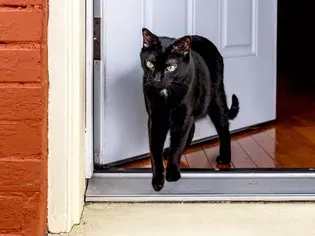How to Stop Your Cat From Escaping
Updated on 04/26/24

Unlocking the Secret to a Secure Feline Haven: How to Stop Your Cat from Escaping
As beloved companions, cats bring immeasurable joy into our lives. However, their adventurous spirits and keen curiosity can sometimes lead to a distressing reality – escaping outdoors. While exploring the unknown may thrill your feline friend, it can be a source of immense anxiety and safety concerns for you.
If your cat has a penchant for wandering, it's crucial to address this issue promptly. Uncontrolled escapes can expose your pet to numerous hazards, including:
* Traffic accidents: Cats are notoriously agile, but they are no match for speeding vehicles.
* Fights with other animals: Outdoor encounters with territorial cats, dogs, or wildlife can escalate into dangerous altercations.
* Exposure to diseases: Roaming cats can contract contagious viruses, parasites, and infections.
* Lost and disoriented: Cats with poor navigational skills can easily become lost, leading to prolonged separation from home.
Fortunately, there are numerous effective strategies you can employ to prevent your cat from escaping. By implementing these measures, you can create a secure and enriching environment where your feline companion can thrive without compromising their safety.
Understanding Your Cat's Escape Motives
Before devising a solution, it's essential to understand why your cat is escaping. Identifying the underlying原因is key to developing a tailored approach that addresses their specific needs.
* Curiosity and exploration: Cats are naturally curious creatures with a strong instinct to explore their surroundings. If your cat has access to an open door or window, they may be tempted to venture outside.
* Boredom or lack of stimulation: Cats require both physical and mental stimulation. If your cat is bored or feels neglected, they may seek adventure outdoors.
* Health problems: Some medical conditions, such as hyperthyroidism or cognitive dysfunction, can cause increased restlessness and wandering. If you suspect a health issue, consult your veterinarian promptly.
* Separation anxiety: Cats can become anxious when left alone for extended periods. This anxiety may manifest as escapism, as they seek companionship or a sense of security outside.
Creating a Secure Indoor Environment
* Secure external access points: Install sturdy screens on windows and lockable gates on doors leading to the outdoors. Consider using motion-activated deterrents, such as ultrasonic devices or sprinklers, to discourage cats from approaching these areas.
* Provide ample enrichment: Cats need plenty of opportunities to play, climb, and explore. Offer a variety of toys, scratching posts, and interactive activities to keep them engaged and entertained indoors.
* Create a safe space: Designate a specific area in your home as a safe haven for your cat. Equip this space with comfortable bedding, food, water, and a litter box. Ensure the area is quiet and secluded, providing your cat with a sense of security and privacy.
* Establish a routine: Cats are creatures of habit. Maintain a regular feeding, playtime, and grooming schedule to provide predictability and reduce boredom.
Addressing Underlying Behavioral Issues
* Tackling boredom: If boredom is a contributing factor, increase your cat's daily play and enrichment activities. Engage them with interactive toys, puzzle feeders, and supervised outdoor time in a secure enclosure.
* Managing separation anxiety: If your cat exhibits signs of separation anxiety, gradually accustom them to being alone. Start with short absences and gradually increase the duration as they become more comfortable. Provide them with calming aids, such as pheromone diffusers or anxiety-reducing supplements.
* Seeking professional help: If you are unable to address your cat's escape behavior on your own, consult a certified animal behaviorist or veterinarian. They can provide personalized guidance and support to address underlying emotional issues.
Additional Tips
* Cat-proof your yard: If you have a yard, make it less enticing by removing potential escape routes, such as holes in fences or low-hanging branches.
* Supervise outdoor time: If you allow your cat supervised outdoor time, keep them on a leash or harness to prevent them from wandering off.
* Consider microchipping: Microchipping provides permanent identification for your cat. If they do escape, a scan can quickly reunite you with your furry friend.
Conclusion
By understanding the reasons behind your cat's escapades and implementing the strategies outlined above, you can effectively prevent them from escaping. Remember that consistency, patience, and a loving approach are essential in creating a safe and secure environment for your cherished feline companion. As you address their needs and provide them with a stimulating and enriching indoor life, you can foster a harmonious bond that will endure for years to come.
Explore More Pets

Cat Behavior Problems
How to Stop Aggression in Kittens

Long-Haired Cat Breeds
Siberian Cat: Breed Profile, Characteristics, & Care

Cat Behavior Problems
How to Stop Kittens From Scratching and Biting

Long-Haired Cat Breeds
Turkish Angora: Cat Breed Profile, Characteristics & Care

Basic Training
How to Socialize Your Kitten

Short-Haired Cat Breeds
Cute Pictures & Facts About Calico Cats & Kittens

Litter Box Training
Training Your Kitten to Use the Litter Box

Long-Haired Cat Breeds
10 Fun Facts About White Cats